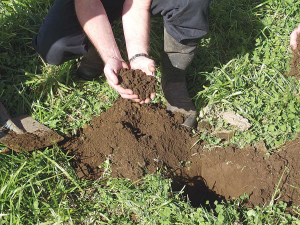Regenerative agriculture is gaining momentum in New Zealand pastoral farming, says Southland based humates company Southern Humates.
It says recent field days and seminars held around the country drew dozens of farmers. These field days have included “RA20”, a series of seminars throughout the North and South Island. Southern Humates has been one of the RA20 sponsors over the seminar series.
The company has been a long-time supplier of humates to the agricultural sector.
Owner Malcolm Sinclair said he is noticing a distinct uplift in interest among pastoral farmers considering their options under a regenerative system, and in turn re-considering what inputs they may need to reach for.
Humates form as organic compounds sourced from the seams of some lignite deposits; consist of complex organic chemicals created by the long term break down of plant material.
It has historically been claimed humates can boost soil fertility through altering soil bacterial populations, increasing the ability of plants to uptake nutrients through their root systems.
“They are taking a fresh look at what the inputs are they really need, and want, for this new approach, and finding humates have a role to play,” Sinclair said.
Apiti dairy farmer and 2018 Ballance Farm Environment Award finalist Lance Gillespie has been using the product for the past two years, and initially incorporated it into his urea applications.
Today Gillespie’s regenerative farming system has advanced to point he rarely uses urea and then only sparingly, but he continues to apply humates to his pastures.
His decision to purchase a towed liquid fertiliser sprayer has enabled him to adopt a “one mix” approach when over-sowing multiple small seed species, incorporating humates, minerals, lime and occasionally urea into the blend.
“I think much of what I have been doing is under the surface, where you can’t see it. This is in terms of promoting soil health.
“The humates help with the uptake of nutrients, breakdown the organic matter and helping soils become more friable, particularly on heavier country,” says Lance.
He has also noticed fungal disease on the grasses that would have otherwise affected stock health having no effect on them.
“We believe this is the humates acting as something of a toxin binder.”
Meantime he also been feeding humates to his 365 milking cows, incorporating it into a bespoke feed pellet he has had the local grain company produce.
“We have noticed our cell count stays low, and health wise the cows are always in good shape, humates help improve gut microbe health.”
In Southland, Wendonside based family dairy farming business the Ditchfield Group have also commenced a regenerative journey, and incorporated humates into the process.
Dylan Ditchfield says while the family is only a year into transitioning to a regenerative system, humates are not an entirely new concept to him.
“We started using it a few years ago under a biological system, went back to a more conventional one. But with regenerative’s more holistic view of animals, soil and plants, we could see a more ‘whole system’ view that worked for us.”
While still learning as they go, the Ditchfields combine Southern Humates humates into the special mix applied to pasture as a liquid that contains a variety of nutrients, occasionally urea, and fish product. This year urea use has been dropped back by over a third, and Dylan would ultimately like to fade it out altogether from their inputs.
He sees humate’s role in helping build soil carbon levels up, and providing humic acid to help promote fungal and mycorrhizal activity in the topsoil zone.
Meantime they are working on a feed system to deliver more regular rations of Stockmate humate feed, also being supplied regularly to the calves.
“They tend to get stuck into it when we first put it out, and over time their intake drops lower as their need reduces. We see it as being invaluable for good gut health, and from there an overall healthier animal.”


















